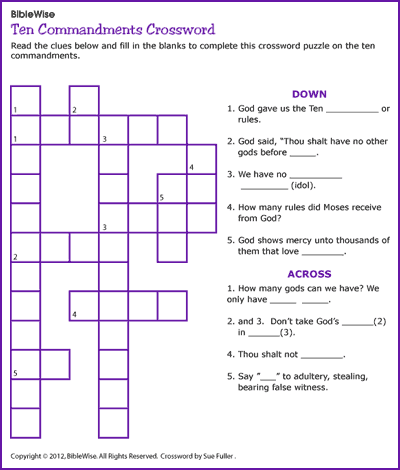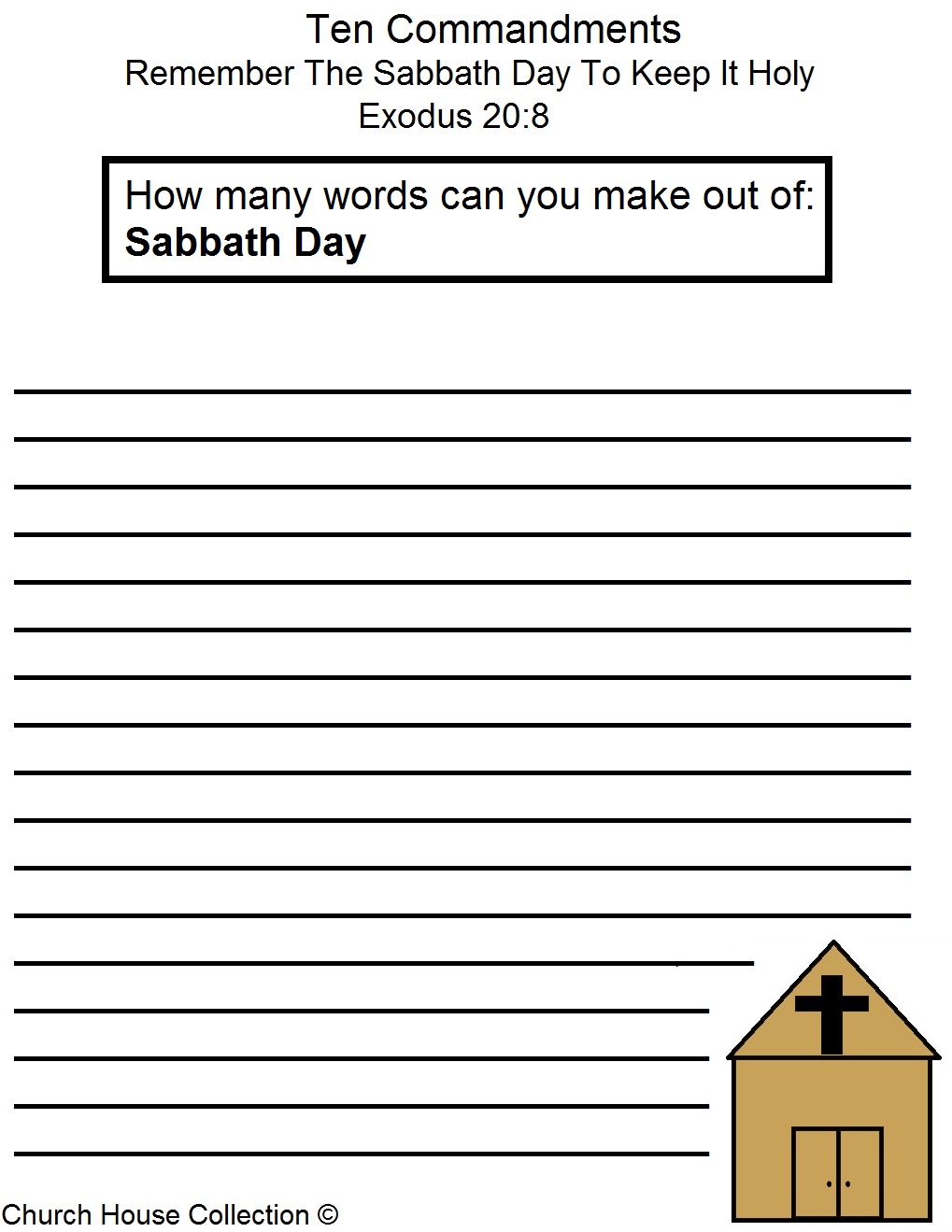LESSON 5 RESPECT GOD'S NAME 15/2/14
THE SECOND COMMANDMENT
EXODUS 20:7 ; DEUTERONOMY 5:11
You shall not take the name of the Lord your God in vain for the Lord will not hold him guiltless who takes his name in vain.
Objective:
To honour and respect God's name
Memory Verse
PROVERBS 18:10
The name of Yahweh is a strong tower; the upright runs to it and is secure(safe).
LESSON PLAN
What's in a name ?
Our names are special and unique , though some of us know others with similar names ,we were all named by our parents/ loved ones for a particular reason. Our names too signify different characteristics and meanings.
God's name is above all as He is the great I AM .Jesus himself tells us in the Lord's prayer "Our Father who art in heaven hallowed be thy name...................
Class to present last weeks home work which was to identify the different names by which God is called in the bible.
HOME WORK from 9/2/14
Question: "What are the different names of God and what do they mean?"
Answer:Each of the many names of God describes a different aspect of His many-faceted character. Here are some of the better-known names of God in the Bible:
ELOHIM:God “Creator, Mighty and Strong” (Genesis 17:7;Jeremiah 31:33) – the plural form of Eloah, which accommodates the doctrine of the Trinity. From the Bible’s first sentence, the superlative nature of God’s power is evident as God (Elohim) speaks the world into existence (Genesis 1:1).
EL SHADDAI:“God Almighty,” “The Mighty One of Jacob” (Genesis 49:24;Psalm 132:2,5) – speaks to God’s ultimate power over all.
ADONAI:“Lord” (Genesis 15:2;Judges 6:15) – used in place of YHWH, which was thought by the Jews to be too sacred to be uttered by sinful men. In the Old Testament, YHWH is more often used in God’s dealings with His people, while Adonai is used more when He deals with the Gentiles. Like Elohim, this too is a plural of majesty. The singular form means “master, owner.” Stresses man’s relationship to God as his master, authority, and provider (Gen. 18:2; 40:1; 1 Sam. 1:15; Ex. 21:1-6; Josh. 5:14).
YHWH / YAHWEH / JEHOVAH:“LORD” (Deuteronomy 6:4;Daniel 9:14) – strictly speaking, the only proper name for God. Translated in English Bibles “LORD” (all capitals) to distinguish it from Adonai, “Lord.” The revelation of the name is first given to Moses “I Am who I Am” (Exodus 3:14). This name specifies an immediacy, a presence. Yahweh is present, accessible, near to those who call on Him for deliverance (Psalm 107:13), forgiveness (Psalm 25:11) and guidance (Psalm 31:3).
YAHWEH-JIREH:"The Lord Will Provide" (Genesis 22:14) – the name memorialized by Abraham when God provided the ram to be sacrificed in place of Isaac.
YAHWEH-RAPHA:"The Lord Who Heals" (Exodus 15:26) – “I am Jehovah who heals you” both in body and soul. In body, by preserving from and curing diseases, and in soul, by pardoning iniquities.
YAHWEH-NISSI:"The Lord Our Banner" (Exodus 17:15), wherebanneris understood to be a rallying place. This name commemorates the desert victory over the Amalekites in Exodus 17.
YAHWEH-M'KADDESH:"The Lord Who Sanctifies, Makes Holy" (Leviticus 20:8;Ezekiel 37:28) – God makes it clear that He alone, not the law, can cleanse His people and make them holy.
YAHWEH-SHALOM:"The Lord Our Peace" (Judges 6:24) – the name given by Gideon to the altar he built after the Angel of the Lord assured him he would not die as he thought he would after seeing Him.
YAHWEH-ELOHIM:"LORD God" (Genesis 2:4;Psalm 59:5) – a combination of God’s unique name YHWH and the generic “Lord,” signifying that He is the Lord of Lords.
YAHWEH-TSIDKENU:"The Lord Our Righteousness” (Jeremiah 33:16) – As with YHWH-M’Kaddesh, it is God alone who provides righteousness to man, ultimately in the person of His Son, Jesus Christ, who became sin for us “that we might become the Righteousness of God in Him” (2 Corinthians 5:21).
YAHWEH-ROHI:"The Lord Our Shepherd" (Psalm 23:1) – After David pondered his relationship as a shepherd to his sheep, he realized that was exactly the relationship God had with him, and so he declares, “Yahweh-Rohi is my Shepherd. I shall not want” (Psalm 23:1).
YAHWEH-SHAMMAH:"The Lord Is There” (Ezekiel 48:35) – the name ascribed to Jerusalem and the Temple there, indicating that the once-departed glory of the Lord (Ezekiel 8—11) had returned (Ezekiel 44:1-4).
YAHWEH-SABAOTH:"The Lord of Hosts" (Isaiah 1:24;Psalm 46:7) –Hostsmeans “hordes,” both of angels and of men. He is Lord of the host of heaven and of the inhabitants of the earth, of Jews and Gentiles, of rich and poor, master and slave. The name is expressive of the majesty, power, and authority of God and shows that He is able to accomplish what He determines to do.
EL ELYON:“Most High" (Deuteronomy 26:19) – derived from the Hebrew root for “go up” or “ascend,” so the implication is of that which is the very highest.El Elyondenotes exaltation and speaks of absolute right to lordship.
EL ROI:"God of Seeing" (Genesis 16:13) – the name ascribed to God by Hagar, alone and desperate in the wilderness after being driven out by Sarah (Genesis 16:1-14). When Hagar met the Angel of the Lord, she realized she had seen God Himself in a theophany. She also realized that El Roi saw her in her distress and testified that He is a God who lives and sees all.
EL-OLAM:"Everlasting God" (Psalm 90:1-3) – God’s nature is without beginning or end, free from all constraints of time, and He contains within Himself the very cause of time itself. “From everlasting to everlasting, You are God.”
EL-GIBHOR:“Mighty God” (Isaiah 9:6) – the name describing the Messiah, Christ Jesus, in this prophetic portion of Isaiah. As a powerful and mighty warrior, the Messiah, the Mighty God, will accomplish the destruction of God’s enemies and rule with a rod of iron (Revelation 19:15).
THEOS: Greek word translated “God.” Primary name for God used in the New Testament. Its use teaches: (1) He is the only true God (Matt. 23:9; Rom. 3:30); (2) He is unique (1 Tim. 1:17; John 17:3; Rev. 15:4; 16:7); (3) He is transcendent (Acts 17:24; Heb. 3:4; Rev. 10:6); (4) He is the Savior (John 3:16; 1 Tim. 1:1; 2:3; 4:10). This name is used of Christ as God in John 1:1, 18; 20:28; 1 John 5:20; Tit. 2:13; Rom. 9:5; Heb. 1:8; 2 Pet. 1:1.
KURIOS: Greek word translated “Lord.” Stresses authority and supremacy. While it can mean sir (John 4:11), owner (Luke 19:33), master (Col. 3:22), or even refer to idols (1 Cor. 8:5) or husbands (1 Pet. 3:6), it is used mostly as the equivalent of Yahweh of the Old Testament. It too is used of Jesus Christ meaning (1) Rabbi or Sir (Matt. 8:6); (2) God or Deity (John 20:28; Acts 2:36; Rom. 10:9; Phil. 2:11).
DESPOTES: Greek word translated “Master.” Carries the idea of ownership while kurios stressed supreme authority (Luke 2:29; Acts 4:24; Rev. 6:10; 2 Pet. 2:1; Jude 4).
FATHER:A distinctive New Testament revelation is that through faith in Christ, God becomes our personal Father. Father is used of God in the Old Testament only 15 times while it is used of God 245 times in the New Testament. As a name of God, it stresses God’s loving care, provision, discipline, and the way we are to address God in prayer (Matt. 7:11; Jam. 1:17; Heb. 12:5-11; John 15:16; 16:23; Eph. 2:18; 3:15; 1 Thess. 3:11).
SING ALONG
The Name of the Lord
Lyrics:
The name of the Lord
Is a strong, strong tower
The name of the Lord
Is a strong, strong tower
The righteous run in and are safe
The righteous run in and are safe
The name of the Lord
Is a strong, strong tower
The name of the Lord
Is a strong, strong tower
For me, for me
Words from Proverbs 18:10; Music by Ken Wood
STUDENTS HAND OUT
LESSON 5 RESPECT GOD'S NAME -THE SECOND COMMANDMENT 15/2/14
EXODUS 20:7 ; DEUTERONOMY 5:11
You shall not take the name of the Lord your God in vain for the Lord will not hold him guiltless who takes his name in vain.
Objective:
To honour and respect God's name
Memory Verse
PROVERBS 18:10
The name of Yahweh is a strong tower; the upright runs to it and is secure(safe).
"What are the different names of God and what do they mean?"
| EL | KURIOS |
| ADONAI | DESPOTES |
| YAHWEH | FATHER |
| JEHOVAH | ABBA |
| THEOS |
|
GROUP ACTIVITY
1.Discuss how we may be using God's name in vain?
2.Discuss what God meant when he said
"for the Lord will not hold him guiltless who takes his name in vain"

Blessed Be The Name of the Lord
Lyrics:
The name of the Lord
Is a strong, strong tower
The name of the Lord
Is a strong, strong tower
The righteous run in and they are safe
The righteous run in and they are safe
The name of the Lord
Is a strong, strong tower
The name of the Lord
Is a strong, strong tower
Words from Proverbs 18:10; Music by Ken Wood

